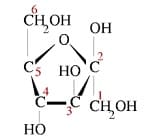In order to discover the meaning of the term fructose, it is necessary, first of all, to know its etymological origin. In this case, we can state that it is the result of the sum of two lexical components:
-The Latin word "fructus", which can be translated as "what is consumed after an effort."
-The suffix "-osa", which was used from the 19th century onwards to refer to sugars.
In addition to what is indicated, we have to emphasize that this term was created by a British chemist named William Allen Miller (1817 – 1870). Specifically, the first time he used it publicly was in a guide to elementary chemistry from 1857.
The notion of fructose is used in the field of biochemistry to refer to the sugar that a fruit has. It is a monosaccharide that, together with glucose , forms sucrose .
 To understand this definition precisely, it is important to be clear about what various concepts refer to. A fruit is an edible fruit : it is the product of certain trees and plants, which is generated from the development of the ovary of a flower.
To understand this definition precisely, it is important to be clear about what various concepts refer to. A fruit is an edible fruit : it is the product of certain trees and plants, which is generated from the development of the ovary of a flower.
Fruits contain various substances, including sugar, which is part of the group of carbohydrates (also called carbohydrates , carbohydrates or saccharides ). In the case of fructose, it is a sugar that is part of the group of monosaccharides since it cannot be decomposed into a simpler sugar through hydrolysis .
The union of fructose and glucose (another type of monosaccharide), on the other hand, allows the constitution of sucrose : table sugar or common sugar. Fructose is considered to be an isomer of glucose since, despite having the same chemical composition, it has other physical properties.
Fructose provides benefits to the brain , muscles and central nervous system. It is a sweetener whose caloric value is about four kilocalories per gram.
The liver is one of the organs responsible for metabolizing fructose, which stores it as glycogen. This metabolization work of the liver could be linked to certain negative effects that are attributed to the consumption of fructose, such as its incidence in obesity and diabetes.
In addition to all of the above, we cannot ignore mentioning what is known as hereditary fructose intolerance. The acronym IHF is what is also called this genetic and metabolic error that is unusual, as only 1 in 20,000 people suffer from it, and which means that when they consume fructose they have to face a long list of consequences.
Specifically, they may feel nausea, vomiting, jaundice, notable dehydration and even hypoglycemia or problems related to liver function.
Given the symptoms they suffer, it is important that these people are diagnosed with hereditary fructose intolerance as soon as possible so that, in this way, they are clear about what they cannot take and thus avoid suffering from those.
